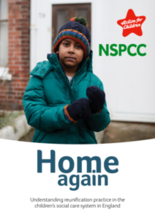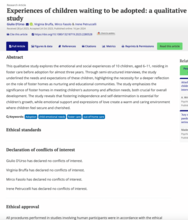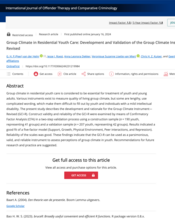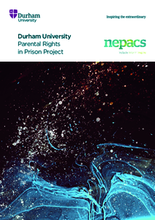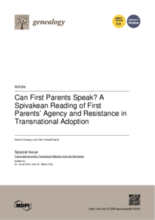Displaying 561 - 570 of 14551
Young people who age out of state care are at risk of a range of negative outcomes. In England, national data provides only five indicators of care leavers’ lives and there are no measures of how young people themselves feel about their transition to adulthood. To fill this gap a new survey to measure subjective wellbeing was coproduced with 31 care leavers. The survey was then distributed by 21 local authorities and completed by 1804 care leavers.
Historically, the needs of LGBTQ+ youth in child welfare systems have mostly not been addressed or, worse, have been invisible to those charged with caring for them.
Understanding reunification practice in the children’s social care system in England
This qualitative study explores the emotional and social experiences of 10 children, aged 6–11, residing in foster care in Italy before adoption for almost three years. Through semi-structured interviews, the study underlined the needs and expectations of these children, highlighting the necessity for a deeper reflection on the role of foster homes as nurturing and educational communities.
Group climate in residential youth care is considered to be essential for treatment of youth and young adults. Various instruments exist to measure quality of living group climate, but some are lengthy, use complicated wording, which make them difficult to fill out by youth and individuals with a mild intellectual disability. The present study based in the Netherlands describes the development and rationale for the Group Climate Instrument—Revised (GCI-R).
One council worker said they had to ‘beg, borrow and steal’ to get the right support
This is a report about the Parental Rights in Prison Project (PRiP) based in Wales and England aimed at supporting incarcerated parents who wished to sustain their relationship with their children who are in the care of the local authority, care of family and significant others or adopted and to provide them with legal advice and support around their rights as parents.
This article analyzes ethical issues arising in transreligious foster care placements in relation to foster children’s needs regarding religious socialization and identification. Applying Urban Walker’s expressive-collaborative framework to 30 qualitative interviews with foster parents, foster children, parents, and professionals, the authors elaborate and apply a three-level reflection on Christian foster parents’ ethics of care in everyday practice of foster care.
This article analyses the search strategies of first families in Bolivia contesting the separation of their children through transnational adoption. These first parents’ claims to visibility and acknowledgement have remained largely ignored by adoption policy and scholarship, historically privileging the perspectives of actors in adoptive countries, such as adoptive parents and adoption professionals.
Drawing on data generated through a substantial ethnography in one secure children's home in England, this paper uses Goffman's (1961) theorising as a conceptual lens to view the institution.


